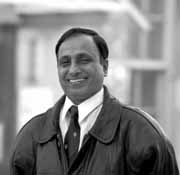

Gopal Menon: One of McGill's builders
"I love working. If I don't have enough work, I feel bored." Though how he would know anything about boredom is a mystery.
Menon is one of three project managers with the Department of Facilities Development, the unit responsible for putting up new buildings and making changes to existing ones. Once funding for a construction or renovation proposal is approved, the project manager makes it happen, overseeing everything from hiring architects to ordering nails.
"I have 42 projects going on as of today," says Menon cheerfully. "They're all at different stages -- design approval, tenders, construction. And this is our slowest time."
His biggest job is the EcoResidence at Macdonald Campus, a new, $1.5-million project which will turn old student housing into a totally environment-friendly living and research space. Any other project at Macdonald is his to handle and he also looks after a chunk of the downtown campus.
"My colleague Richard Siteman handles most of the jobs from the Arts Building down. Behind the Arts Building going up the hill, it's all mine. Our third project manager, Bob Stanley, handles the really major things, over $5 million."
In addition to hard work, Menon says the key to his job is being really organized. Experience helps, too, and he has plenty. "I started in 1977 as a building designer. That meant structural changes to the interior of buildings. My background is mechanical engineering, and as long as you know the codes, you can make changes like adding labs or moving classrooms. For big jobs or when you need to move fast, we hire architects or engineering consultants."
In 21 years, Menon has honed management skills and learned all about building codes, budgets and contracts, but says his biggest challenge has come from his family.
"I have two boys, 13 and 17. They took up hockey and I was asked a few years ago if I would help coach. I used to play field hockey at college in India, so some things about the game are similar. The coaching part is easy, but learning to skate -- now that was hard," he laughs. "I even play a little hockey myself now."
Between work and time spent at the arena, Menon says his days usually run to 18 or 19 hours. Still, he wouldn't change anything. "I love working at McGill. My brother worked here in the '70s and he recommended me for an interview. It was for a temporary position and the pay wasn't very good, so I decided there was no reason to leave the job I had. Six months later, they offered me a permanent position. I liked working here right away, and I haven't thought about going anywhere else since I started."
On reflection, Menon says there is one problem with his job. But he acknowledges that, for the moment, there seems to be no solution.
"We build a lot of things, but we don't have the money to maintain them. So many things we do are just patching up. We don't have the resources to really fix things properly. I find that very sad."
Diana Grier Ayton
| 


